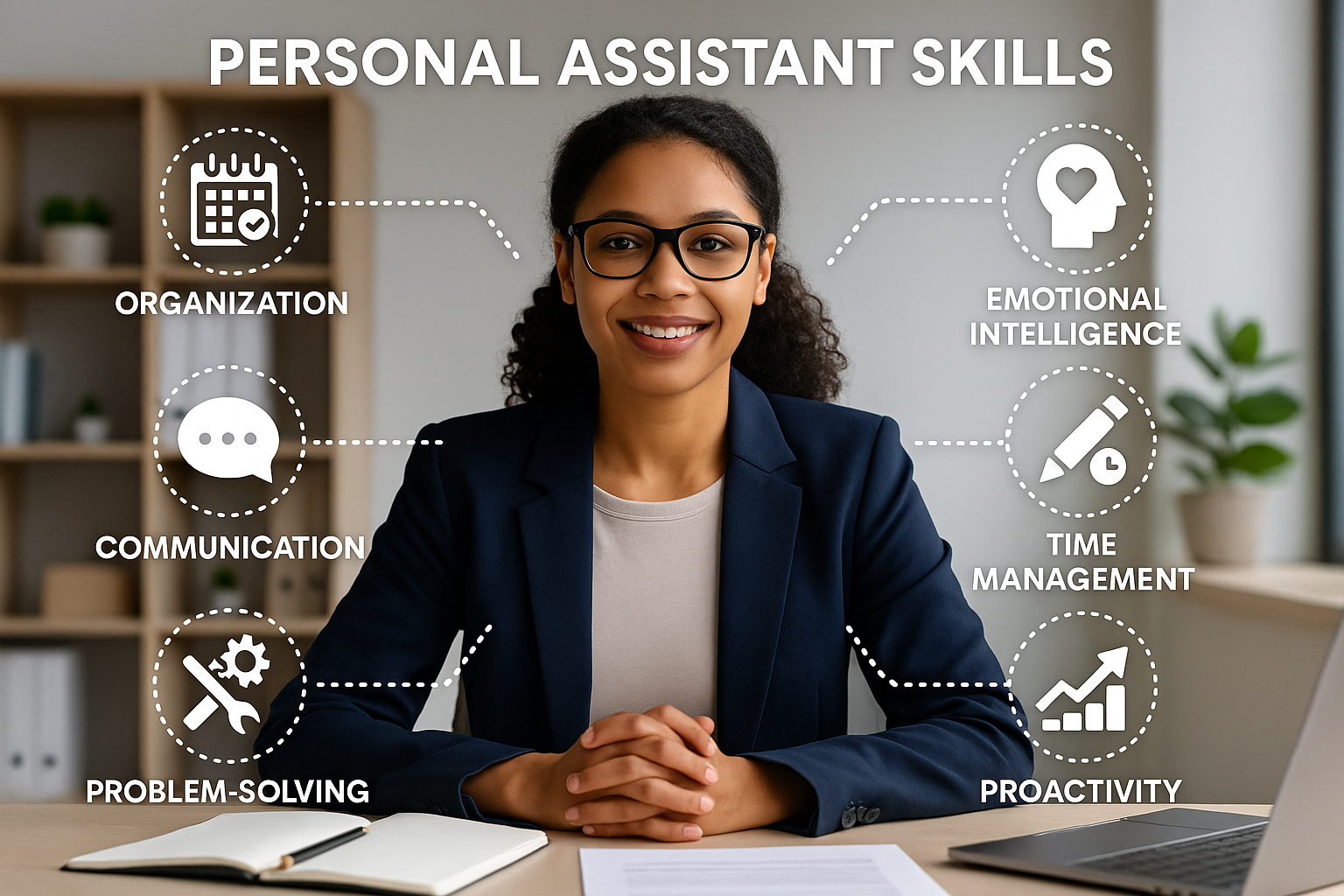Becoming an effective personal assistant (PA) involves much more than handling administrative tasks and scheduling meetings. Personal assistants are critical support figures who help executives, managers, and busy professionals perform at their best. To succeed in this role, mastering certain key skills is essential.
In this blog, we'll explore the most important personal assistant skills you need to excel and thrive in your career.
1. Exceptional Organizational Skills
At the heart of every successful personal assistant is impeccable organizational capability. You'll juggle numerous tasks, appointments, deadlines, and responsibilities simultaneously. Effective organizational skills help ensure nothing slips through the cracks.
Key organizational abilities include:
- Managing complex calendars
- Coordinating logistics efficiently
- Keeping accurate and detailed records
- Creating systems and processes to streamline workflows
- Maintaining orderly filing and record-keeping systems
- Anticipating scheduling conflicts and resolving them proactively
2. Strong Communication Skills
Clear and effective communication is a cornerstone of being a proficient personal assistant. You’ll regularly communicate with your employer, colleagues, clients, and external partners, making excellent interpersonal skills critical.
Important aspects of communication include:
- Professional and courteous interaction
- Clear and concise written communication (emails, memos, reports)
- Effective verbal communication
- Active listening to anticipate employer needs
- Conveying information accurately and promptly
- Managing difficult conversations tactfully and diplomatically
3. Discretion and Trustworthiness
As a personal assistant, you’ll frequently handle sensitive or confidential information. Discretion and trustworthiness are critical, as your employer needs to rely on your integrity and judgment.
Practices to maintain discretion include:
- Confidential handling of private documents
- Discreet management of personal and professional information
- Understanding boundaries and maintaining confidentiality
- Demonstrating loyalty and integrity consistently
- Managing sensitive information carefully during communications
4. Technical Proficiency
Today’s personal assistant role heavily involves using technology. Comfort with various digital tools and software applications can significantly enhance your effectiveness and efficiency.
Technical skills often required include:
- Proficiency with Microsoft Office Suite (Word, Excel, PowerPoint)
- Familiarity with Google Workspace (Docs, Sheets, Calendar)
- Expertise in scheduling and project management tools (Trello, Asana, Calendly)
- Basic troubleshooting abilities for technology issues
- Staying updated on new digital tools and software relevant to your role
- Managing virtual meetings and online collaboration effectively
5. Adaptability and Flexibility
The daily tasks of a personal assistant can shift rapidly and unpredictably. Being adaptable and flexible in responding to new demands or challenges is vital.
Strategies for cultivating adaptability:
- Staying calm and composed under pressure
- Quickly adjusting to changes in schedules or plans
- Being open to new tasks or responsibilities
- Developing a proactive approach to unexpected events
- Maintaining a positive attitude during changes
6. Time Management and Prioritization
Efficient time management and prioritization are crucial personal assistant skills. The ability to identify urgent tasks, delegate effectively, and manage your time well ensures productivity and efficiency.
Techniques for effective time management:
- Prioritizing tasks according to urgency and importance
- Using digital tools or planners to schedule tasks
- Regularly reassessing and adjusting priorities as needed
- Setting clear goals and deadlines to maintain productivity
- Delegating effectively to balance workloads
7. Problem-Solving Abilities
Personal assistants often encounter unexpected problems or issues. Strong problem-solving skills enable you to identify challenges quickly, assess options, and implement effective solutions without extensive oversight.
Key problem-solving methods include:
- Assessing issues clearly and logically
- Making informed and confident decisions
- Staying resourceful and proactive when challenges arise
- Thinking creatively to develop innovative solutions
- Consulting others and seeking advice when appropriate
8. Attention to Detail
Precision and accuracy are critical in the role of a personal assistant. Attention to detail ensures every task is completed correctly, schedules are accurate, and documents are error-free.
Ways to ensure detail-oriented work:
- Regularly double-checking schedules and documents
- Maintaining meticulous records and notes
- Developing thorough and accurate checklists
- Reviewing your work critically before submission
- Ensuring compliance with relevant guidelines and policies
9. Proactivity and Initiative
Anticipating your employer's needs before they arise demonstrates exceptional personal assistant skills. Being proactive and taking initiative helps maintain smooth operations and reduces unnecessary stress for your employer.
Cultivating a proactive approach:
- Regularly communicating to understand upcoming priorities
- Anticipating potential issues and preparing solutions in advance
- Taking ownership of tasks without needing explicit direction
- Seeking opportunities for improvement and efficiency
- Suggesting new ideas to streamline processes
10. Emotional Intelligence and Interpersonal Skills
Understanding and managing emotions effectively, both your own and those around you, enhances professional relationships and workplace harmony. Emotional intelligence is particularly vital in roles involving extensive interaction.
Enhancing emotional intelligence:
- Demonstrating empathy and sensitivity toward others
- Managing stressful situations calmly
- Building strong professional relationships through effective interpersonal interactions
- Recognizing emotional cues and responding appropriately
- Adjusting your communication style to match others' needs
11. Continuous Learning and Professional Development
Successful personal assistants continually improve their skills and knowledge. Staying informed about industry trends, new technologies, and best practices can significantly enhance your career.
Ways to engage in continuous learning:
- Attending relevant workshops and seminars
- Participating in online courses or certifications
- Regularly seeking feedback to improve performance
- Reading industry-related publications and resources
Enhance Your Personal Assistant Skills Today
Developing these essential personal assistant skills can significantly advance your career and increase your value to employers. If you're ready to sharpen these competencies further, consider enrolling in specialized educational programs.
Learn more about how the National Career College’s Online Business Management and Accounting Program can help elevate your personal assistant skills and career today.

